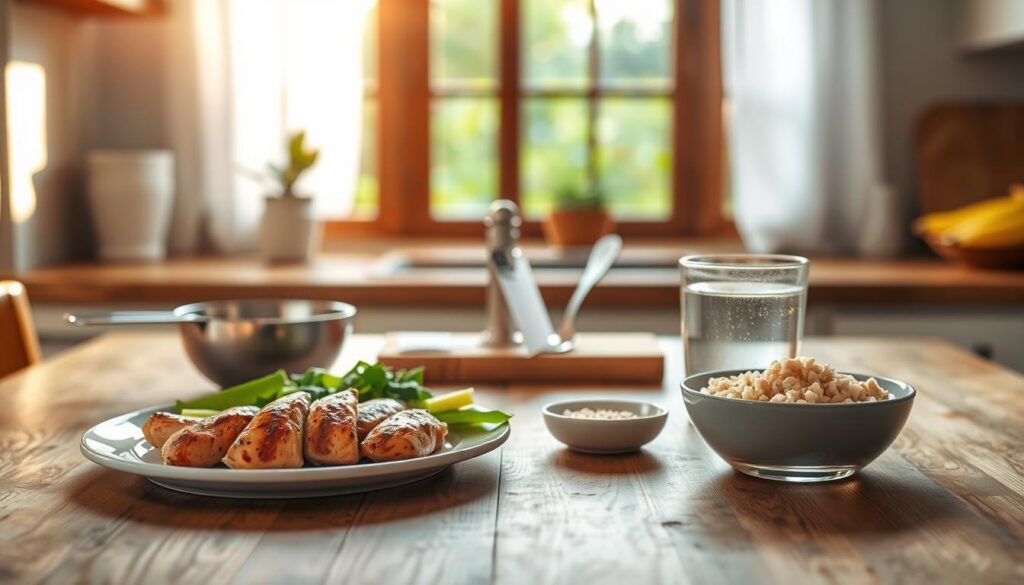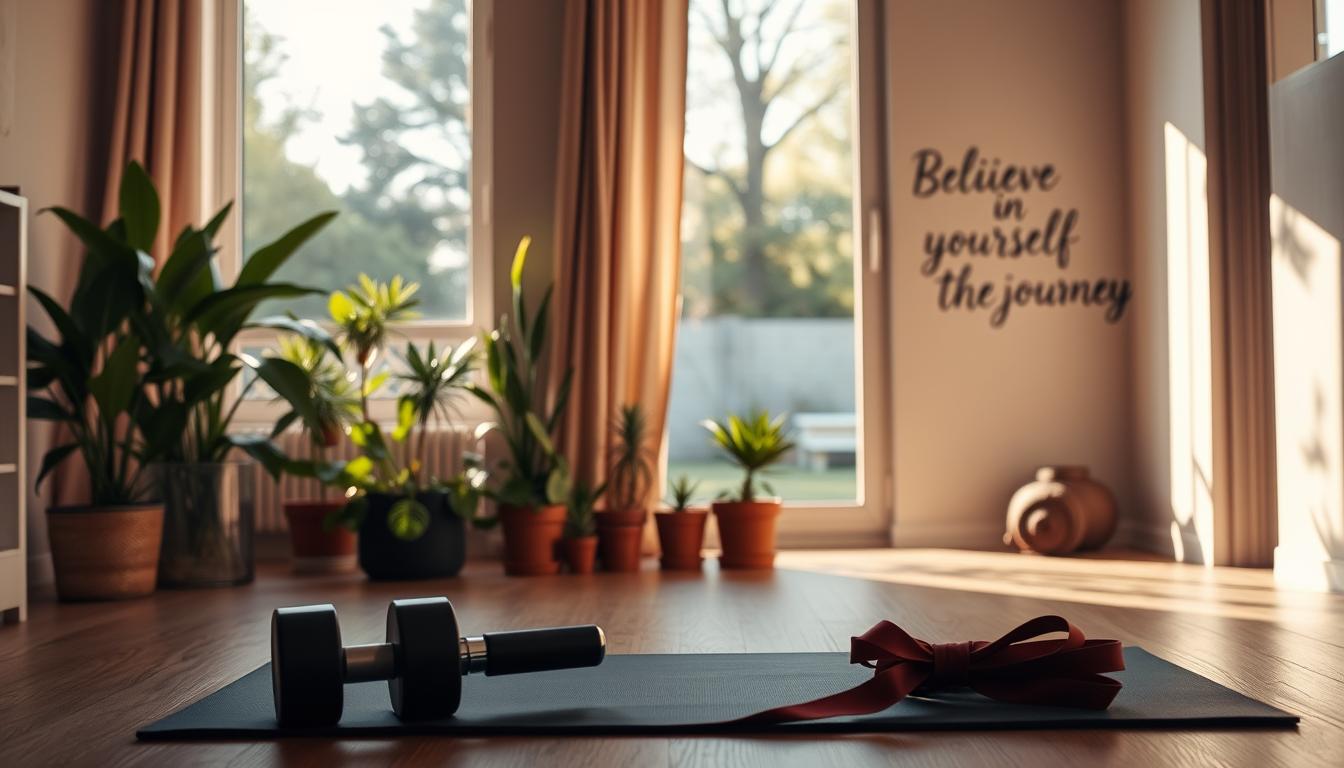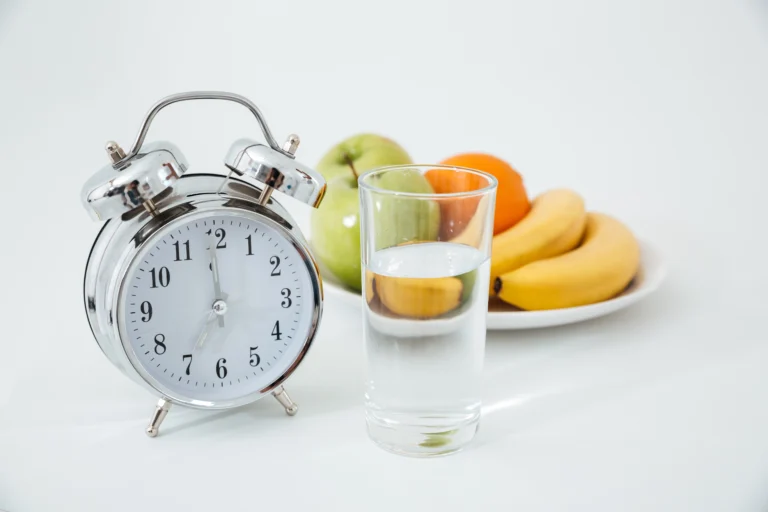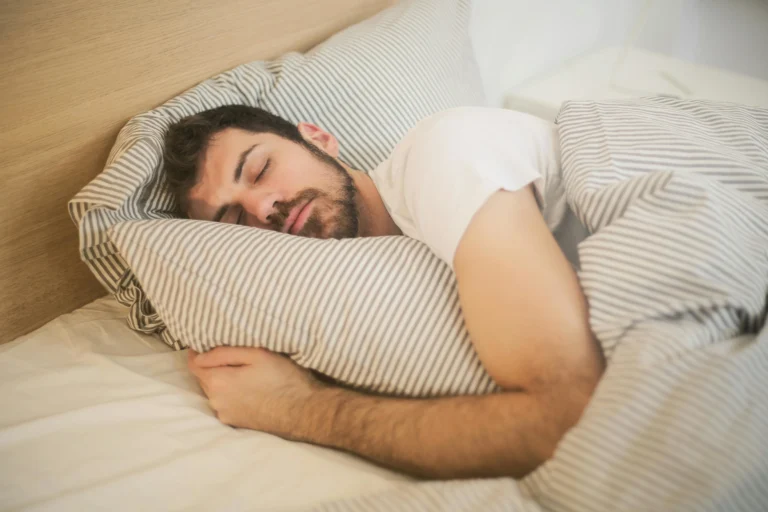Lose Weight at Home: Easy Tips & Tricks
Struggling to lose weight? You’re not alone. Lose weight at home is not only possible but also very effective. Many find that home workouts motivate them to change their health without needing expensive gyms or fancy equipment.
Your body can make amazing changes. By using simple, science-backed tips for losing weight at home, you can make lasting lifestyle changes. This guide will show you how to reach your weight loss goals from the comfort of your living room.
Every weight loss journey starts with small, consistent steps. These steps can lead to big changes. Whether you want to improve your health, boost your confidence, or feel more energetic, these home-based strategies will guide you to success.
Ready to see how easy and empowering weight loss can be? Your transformation starts now, right where you are.
Table of Contents
Understanding the Basics of Weight Loss Science
Losing weight at home starts with knowing how your body uses calories and energy. The science of losing weight is more than just eating less. Your metabolism is key to losing those extra pounds.
Knowing how to boost your metabolism is powerful. Your body burns calories in different ways. This includes basic functions, physical activity, and digestion.
How Your Body Burns Calories
Every move you make uses energy. Your body burns calories all the time, even when you’re not moving. Here’s how it works:
- Basal metabolic rate accounts for 60-75% of daily calorie expenditure
- Physical activity burns 15-30% of calories
- Digestion uses about 10% of daily caloric intake
The Role of Metabolism in Weight Loss
Metabolism is your body’s calorie-burning engine. Several factors affect your metabolism, including:
- Muscle mass – More muscle means a higher metabolic rate
- Age – Metabolism slows down as you get older
- Genetics – Some people naturally have faster metabolisms
Creating a Caloric Deficit
To lose weight at home, you need to burn more calories than you eat. This is called a caloric deficit. Aim for:
“A sustainable weight loss of 1 to 2 pounds per week by burning 500 to 750 calories more than you consume daily.”
By understanding these basics, you can create a weight loss plan that fits your body’s needs.
Creating a Sustainable Meal Plan for Weight Loss
Creating healthy meal plans for weight loss is simple. Start by making nutritious, low-calorie recipes. These should keep you full and give you energy.
“Nutrition is the foundation of any successful weight loss strategy.” – American Dietetic Association
To make a good meal plan, think strategically. Here are the main parts of a weight loss nutrition plan:
- Focus on nutrient-dense foods
- Control portion sizes
- Balance macronutrients
- Prepare meals in advance
Your meal plan should have a variety of low-calorie recipes. These recipes should give you all the nutrients you need. Here’s a daily nutritional guide for weight loss:
| Nutrient | Recommended Amount |
|---|---|
| Calories | 1,500-1,700 per day |
| Protein | 70-90 grams |
| Fiber | 30-45 grams |
| Healthy Fats | 45-65 grams |
Meal prepping is a big help for keeping up with healthy meals. Make your low-calorie recipes ahead of time to avoid bad food choices. Spend a few hours each week cooking and portioning meals. This can really help you lose weight.
Good meal planning strategies include:
1. Choose lean proteins like chicken and fish
2. Include plenty of vegetables
3. Select whole grains
4. Use portion control techniques
5. Stay hydrated
Remember, losing weight for good is about making a lifestyle change, not just following a diet. Your meal plans should be fun, healthy, and fit your personal needs.
Effective Home Workout Routines Without Equipment
You don’t need expensive gym memberships or fancy equipment to transform your body. A good home workout routine can help you burn fat using just your body weight. The secret is being consistent and planning your exercises wisely.
The Centers for Disease Control say you need 150 minutes of moderate-intensity cardio each week. Your home workout can meet this goal and help you lose weight.
Bodyweight Exercises for Beginners
No equipment exercises are great for losing weight. Here’s a simple routine that works on many muscle groups:
- Push-ups: 10 repetitions
- Bodyweight squats: 20 repetitions
- Lunges: 10 per leg
- Jump jacks: 30 repetitions
- Plank: 15 seconds
Circuit Training at Home
Circuit training boosts your fat burning. Do 2-3 rounds of the exercises with 30-60 seconds rest in between. This keeps your heart rate up and increases your metabolism.
| Exercise Type | Frequency | Duration |
|---|---|---|
| Beginner Bodyweight Workout | 2-4 times weekly | 15-20 minutes |
| Rest Period | 48 hours between sessions | Crucial for muscle recovery |
Building a Weekly Exercise Schedule
Mix strength training and cardio in your routine. Gradually increase the number of repetitions or add more complex exercises every 4-6 weeks.
“The best workout is the one you’ll actually do consistently.” – Fitness Experts
Remember, no equipment exercises can be as tough as gym workouts if done with the right form and dedication.
Smart Kitchen Habits to Lose Weight at Home
Creating a weight-loss-friendly kitchen is key to losing weight at home. Your kitchen setup affects your eating habits and portion control. Smart kitchen practices can help you on your weight loss journey.
“Your kitchen is the foundation of your health transformation.” – Nutrition Expert
Here are key strategies to make your kitchen a weight loss ally:
- Use smaller plates to naturally reduce portion sizes
- Organize your refrigerator for healthy eating
- Prep meals in advance to control intake
- Store healthy snacks at eye level
Portion control starts with visual cues. Research shows that using smaller plates can help reduce calorie consumption. A 2021 review found that portion-control plates helped participants reduce body weight, BMI, and waist circumference.
| Kitchen Strategy | Weight Loss Impact |
|---|---|
| Smaller Plates | Reduces portion sizes by 20-30% |
| Meal Prepping | Decreases unplanned eating by 75% |
| Organized Fridge | Promotes healthier food choices |
These kitchen habits can make your weight loss journey more sustainable. By creating a supportive environment, you’ll find it easier to manage your portions and make nutritious choices.
Natural Ways to Boost Your Metabolism
Boosting your metabolism is key to losing weight at home. Learning how to naturally speed up your metabolic rate can help you reach your fitness goals. Here are some tips to boost your metabolism and change your health journey.
Metabolism-Enhancing Foods
Some foods can really boost your metabolism. Add these powerful foods to your diet:
- Green tea: It’s full of antioxidants and can help burn fat
- Protein-rich foods: They can increase your metabolism by up to 30% while you digest them
- Spicy peppers: They have capsaicin, which can make your metabolism go up for a while
- Water: Drinking 500 ml can make your metabolism go up by 30% for an hour
Daily Metabolism-Boosting Habits
Small changes in your daily life can greatly improve your metabolic health. Here are some effective strategies:
- Get 7-9 hours of sleep every night
- Stand or walk every 30 minutes
- Try high-intensity interval training (HIIT)
- Drink water all day
“Your metabolism is not fixed – it can be optimized with the right approach.” – Nutrition Expert
Strategic Meal Timing
When you eat is as important as what you eat. Research shows that eating at the right times can boost your metabolism and help you lose weight at home. Here are some tips:
- Eat protein within 30 minutes of waking
- Drink water 30-120 minutes before meals
- Try intermittent fasting
- Avoid eating late at night
By using these natural metabolism boosting tips, you can manage your weight effectively from home.
Portion Control Strategies for Weight Management

Learning to control your portions is key to managing your weight at home. The size of your plate, how you eat, and your meal choices greatly affect your diet and health.
“Portion control is not about eating less, but about eating right.” – Nutrition Expert
Effective portion control strategies can help you lose weight without feeling like you’re missing out. Studies show that simple methods can cut down on calories a lot.
- Use smaller plates to naturally reduce food portions
- Pre-portion snacks in individual containers
- Drink water before meals to feel fuller
- Practice mindful eating techniques
Visual cues are powerful in controlling portions. Here are some personal measurement guidelines:
| Food Type | Recommended Portion |
|---|---|
| Carbohydrates | One rounded handful |
| Dried Fruits/Nuts | One small handful |
| Fruits/Vegetables | One fist-size |
| Meat/Poultry | One palm-size |
Studies show that eating from smaller plates can cut food intake by up to 29%. Also, keeping a food diary can make you more aware of your eating habits. This can help you reach your weight loss goals at home.
Remember, portion control is not about cutting back. It’s about building healthy eating habits that support your health and weight goals.
The Power of Mindful Eating and Hydration
Changing how you eat can really help when you’re trying to lose weight at home. Mindful eating is more than just eating. It’s about really connecting with your food and knowing what your body needs.
Being aware of your eating habits can make a big difference in your health. Studies show that mindful eating has many benefits:
- 40% of people feel less anxious when they eat mindfully
- 20% eat less because they’re more aware of their hunger
- 50% are more likely to choose healthy foods
Understanding Hunger vs. Cravings
It’s important to know the difference between real hunger and cravings. True hunger takes time to build up, but cravings come on fast. Ask yourself: Are you really hungry, or are you eating for comfort?
Water Intake Guidelines
| Body Weight | Daily Water Intake |
|---|---|
| 100 lbs | 50 oz |
| 150 lbs | 75 oz |
| 200 lbs | 100 oz |
Mindful Eating Techniques
Try these tips to change how you view food:
- Eat slowly and enjoy each bite
- Don’t eat while watching TV or scrolling on your phone
- Use smaller plates to eat less
- Check if you’re hungry before, during, and after eating
“Mindful eating is not about being perfect. It’s about being present and aware of your eating experience.”
By adding these mindful eating habits to your daily life, you can make lasting changes. These changes will help you on your weight loss journey and improve your health.
Sleep and Stress Management for Weight Loss

When trying to lose weight at home, many forget about sleep and stress. Your body needs more than just diet and exercise to lose weight.
“Quality sleep is the silent hero of weight loss transformation.”
Research shows a strong link between sleep, stress, and weight. People who sleep less than 6 hours are more likely to be obese. Poor sleep can also hurt your motivation to work out at home.
- Sleep deprivation increases hunger hormones
- Chronic stress triggers emotional eating
- Irregular sleep patterns disrupt metabolism
Sleep affects how your body works. Men who sleep only 4 hours have more hunger hormones and less fullness hormones.
| Sleep Duration | Metabolic Impact |
|---|---|
| Less than 6 hours | High risk of weight gain |
| 7-9 hours | Optimal metabolic function |
To improve your weight loss at home, focus on sleeping well and managing stress. Try meditation, deep breathing, and better time management.
Pro Tip: Create a relaxing bedtime routine to support your weight loss goals.
Tracking Progress and Staying Motivated
Tracking your weight loss journey is key to keeping up motivation and getting lasting results. By monitoring yourself, you get clear views of your progress.
“Success is not about perfection, but consistent progress”
Calorie tracking is more than just weighing yourself. Use different ways to see your changes:
- Weekly weight measurements
- Body measurement tracking
- Progress photography
- Digital fitness app logging
Studies show people who track their progress are 2-3 times more likely to hit their weight loss goals. Using the S.M.A.R.T goal-setting method boosts your motivation and accountability.
| Tracking Method | Frequency | Benefits |
|---|---|---|
| Scale Weigh-ins | Weekly | Monitor overall weight trend |
| Body Measurements | Monthly | Track inch loss |
| Progress Photos | Every 4-6 weeks | Visual transformation evidence |
Pro tip: Celebrate behavior changes, not just weight milestones. Recognize your commitment to healthier habits!
Remember, losing weight at a steady pace is 1-2 pounds a week. Stay patient and keep tracking to stay motivated on your home fitness path.
Conclusion
Your journey to lose weight at home is a personal transformation. It needs patience, dedication, and a good plan. The home workout routine is more than just exercise. It’s a way to change your whole lifestyle.
Remember, losing weight is not about quick fixes. It’s about making small, consistent changes. These changes help build lasting health habits.
Self-monitoring is key to your success. Keeping track of your meals and understanding portion control helps a lot. The American Heart Association suggests 150 minutes of moderate activity a week. You can fit this into your home workouts easily.
Focus on making progress, not being perfect. Every small step gets you closer to your health goals.
Your commitment to nutrition, exercise, and a mindful lifestyle is crucial. The CDC says lifestyle changes are important. These include good nutrition, regular exercise, and managing stress.
By using the strategies from this guide, you’ll have a solid plan for losing weight at home. This plan goes beyond quick fixes and aims for lasting change.
Start this journey with positivity and keep going. Your body can change a lot when you take care of it. Eat well, move purposefully, and believe in yourself. Begin today and stay motivated to reach your health and fitness goals.
FAQ
Can I really lose weight effectively at home without gym equipment?
How many calories should I aim to cut to lose weight?
What are the best no-equipment exercises for weight loss?
How important is hydration in weight loss?
How can I boost my metabolism at home?
What are some tips for portion control?
How can I stay motivated during my weight loss journey?
What should I eat to support weight loss?
How important is sleep in weight loss?
Can I lose weight without counting calories?
Source Links
- 50 easy ways to lose weight – https://www.bbcgoodfood.com/health/weight-loss/50-easy-ways-to-lose-weight
- 25 Weight Loss Tips to Lose Weight the Healthy Way – https://www.everydayhealth.com/diet-and-nutrition/diet/tips-weight-loss-actually-work/
- How to Lose Weight: Healthy Plans for Weight Loss – https://www.helpguide.org/wellness/weight-loss/how-to-lose-weight-and-keep-it-off
- A Simple 7-Day, 1,200-Calorie Weight Loss Meal Plan – https://www.goodhousekeeping.com/health/diet-nutrition/g4351/1200-calorie-diet-plan/
- Clean-Eating Meal Plan for Beginners, Created by a Dietitian – https://www.eatingwell.com/article/7882092/clean-eating-meal-plan-for-beginners/
- 7-Day Meal Plan to Lose Weight, Created by a Dietitian: 1,600 Calories – https://www.eatingwell.com/article/287726/7-day-diet-meal-plan-to-lose-weight-1600-calories/
- Bodyweight Workout for Beginners (20-Minute at Home Routine) – https://www.nerdfitness.com/blog/beginner-body-weight-workout-burn-fat-build-muscle/
- Here Are 5 At-Home Workouts To Lose Weight – https://www.health.com/fitness/at-home-workouts-to-lose-weight
- The Ultimate Home Workout for Each Fitness Level – https://www.healthline.com/health/fitness-exercise/at-home-workouts
- 26 Weight-Loss Recipes for Beginners – https://www.eatingwell.com/gallery/7902553/weight-loss-recipes-for-beginners/
- 9 Proven Ways to Lose Weight Without Diet or Exercise – https://www.healthline.com/nutrition/11-ways-to-lose-weight-without-diet-or-exercise
- 9 Meal-Prep Ideas for Healthy Eating and Weight Loss – https://www.loseit.com/articles/meal-prep-ideas-for-healthy-eating-and-weight-loss/
- How to Lose Weight Naturally: 29 Tips Supported by Science – https://www.healthline.com/nutrition/30-ways-to-lose-weight-naturally
- 12 Natural Ways You Can Boost Your Metabolism – https://www.verywellhealth.com/how-to-boost-metabolism-7501652
- 12 natural ways to increase your metabolism – https://www.medicalnewstoday.com/articles/323328
- Should You Use Portion Control for Weight Loss? – https://www.health.com/weight-loss/14-ways-to-cut-portions-without-feeling-hungry
- 9 Tips to Measure and Control Portion Sizes – https://www.healthline.com/nutrition/portion-control
- Friday Quick Tips: “7 Portion-Control Tricks for Weight-Loss” Review — Personal Trainer Denver – https://www.michaelmoodyfitness.com/personaltrainersfitnessanddietblog/7-portion-control-tricks-for-weight-loss
- Mindful Eating: A Path to Better Health and Well-being – https://newvitality.ie/mindful-eating-for-better-health-enhancing-mental-and-physical-well-being-through-awareness/
- 5 Powerful Reasons to Practice Mindful Eating For Better Health – https://fitonapp.com/nutrition/the-benefits-of-mindful-eating/
- Steps for Losing Weight – https://www.cdc.gov/healthy-weight-growth/losing-weight/index.html
- Sleep and Weight Loss – https://www.sleepfoundation.org/physical-health/weight-loss-and-sleep
- 16 Ways to Motivate Yourself to Lose Weight – https://www.healthline.com/nutrition/weight-loss-motivation-tips
- Effective Methods to Track Your Weight Loss Progress – https://www.noom.com/blog/weight-management/how-to-track-weight-loss-progress-for-lasting-results/
- Successful weight loss: 10 tips to lose weight – https://www.medicalnewstoday.com/articles/303409
- 11 Natural Home Remedies to Lose Weight – https://www.aarp.org/health/healthy-living/info-2024/home-remedies-for-weight-loss.html
- Women’s Guide to Losing Weight at Home [10 TIPS] – Vecura wellness – https://www.vecurawellness.com/blog/fast-and-effective-womens-guide-to-losing-weight-at-home/








2 Comments
Comments are closed.